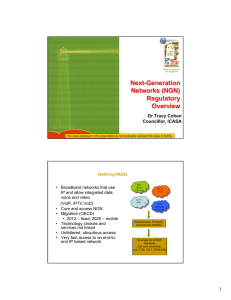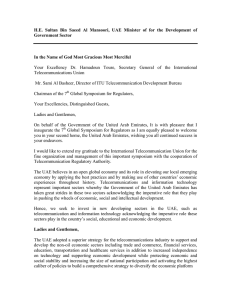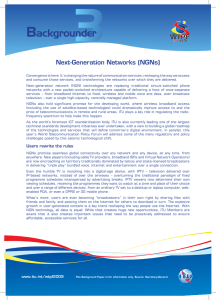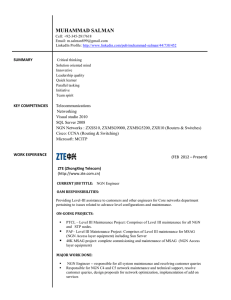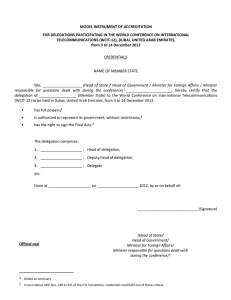Why are Wireline Providers Deploying NGNs? NGN Enabling Environment
advertisement
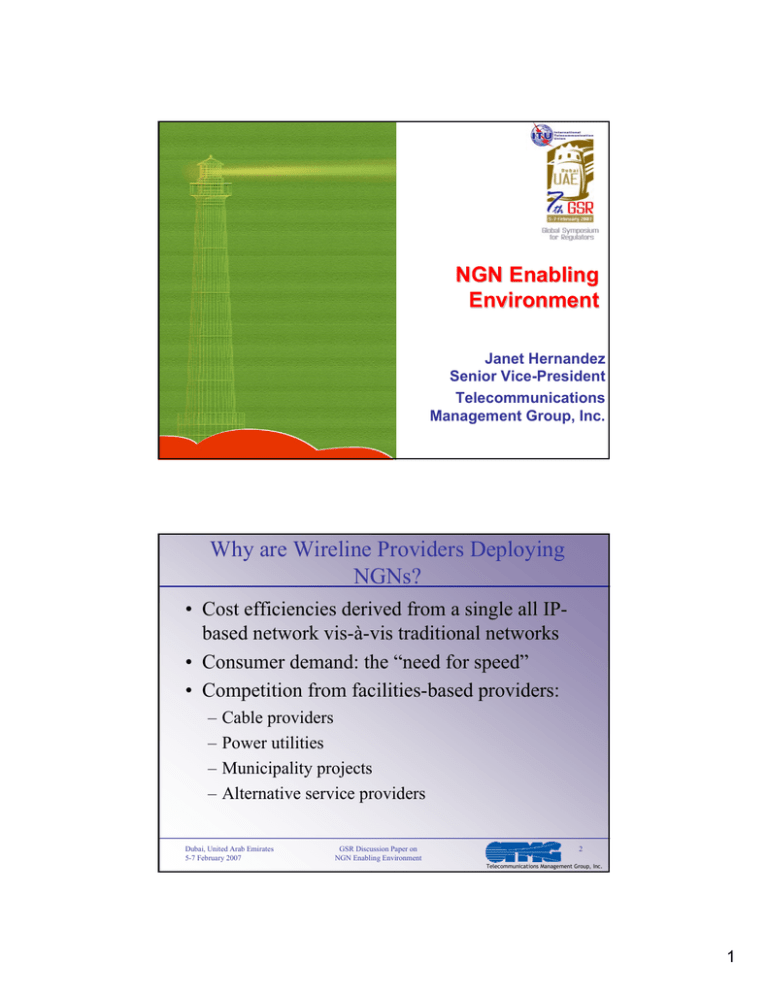
NGN Enabling Environment Janet Hernandez Senior Vice-President Telecommunications Management Group, Inc. Why are Wireline Providers Deploying NGNs? • Cost efficiencies derived from a single all IPbased network vis-à-vis traditional networks • Consumer demand: the “need for speed” • Competition from facilities-based providers: – – – – Cable providers Power utilities Municipality projects Alternative service providers Dubai, United Arab Emirates 5-7 February 2007 GSR Discussion Paper on NGN Enabling Environment 2 Telecommunications Management Group, Inc. 1 How Should Regulators Enable the Migration Towards NGNs? • Regulators will need to strike the right balance between promoting competition on one side and efficient investment and innovation on the other • Regulatory certainty is crucial for this transition • Should NGNs be regulated under existing frameworks: ex ante obligations on dominant providers? • Will this deter investment? – NGN deployment in the UK v. Australia • Do NGNs give rise to new/emerging markets? Should NGNs be free from legacy regulation? – Permanent forbearance: U.S. and Hong Kong, China – Regulatory holidays: Germany Dubai, United Arab Emirates 5-7 February 2007 GSR Discussion Paper on NGN Enabling Environment 3 Telecommunications Management Group, Inc. Is the Regulatory Framework Ready for NGN? Checklist of Issues for Regulators to Consider Regarding NGN 1) 2) 3) 4) 5) 6) 7) Does the regulatory framework present any market entry barriers? Does the current licensing framework facilitate different services over different platforms (i.e., technology neutrality)? How are VoIP and other IP-based services regulated? What are the regulatory policies for these new technologies and services with regard to numbering, spectrum, interconnection, universal service, and rights of ways and shared deployment? Does the regulatory framework promote diversification of access networks? Are institutional and structural changes of the regulatory authority required to address an NGN environment? Does the regulatory framework encourage and facilitate public (municipal) initiatives? Dubai, United Arab Emirates 5-7 February 2007 GSR Discussion Paper on NGN Enabling Environment 4 Telecommunications Management Group, Inc. 2 Modifications to Regulatory Frameworks Market Barriers Licensing VoIP Regulation Dubai, United Arab Emirates 5-7 February 2007 • Introducing regulatory changes to eliminate or modify restrictions that impede operators from entering other markets • Shifting to more flexible licensing regimes with broader category of licenses (e.g., Malaysia, Uganda) in some countries and to unified licensing system in others (Argentina, Peru, EU, Morocco, India (proposed)) • Adhering to technology neutrality in licensing • Simplifying licensing processes (shift from individual license and class licenses to notifications, registrations and/or deregulation) • Numerous jurisdictions are introducing VoIP-specific regulation GSR Discussion Paper on NGN Enabling Environment 5 Telecommunications Management Group, Inc. Modifications to Regulatory Frameworks Interconnection • Symmetrical interconnection approach • Considering whether to extend ad hoc interconnection to network infrastructure via direct access or resale (local loop unbundling and bitstream) • Capacity-based interconnection Numbering • Assignment of numbering resources to new technology services providers (e.g., VoIP) • Inter-modal portability between different services (fixed-to-mobile and vice versa) • ENUM initiative Rights of Way and Shared Deployment Dubai, United Arab Emirates 5-7 February 2007 • Facilitating use of public/municipal infrastructure (ducts, poles, etc.) or public property (federal land) • Promoting shared NGN deployment to reduce costs GSR Discussion Paper on NGN Enabling Environment 6 Telecommunications Management Group, Inc. 3 Modifications to Regulatory Frameworks Universal Service Spectrum Institutional Change Dubai, United Arab Emirates 5-7 February 2007 • Modifying the scope (from voice to data service and broadband services, where it is required by the market) • Modifying sources of funding (to include IP-based services, such as broadband and VoIP) • Introducing flexible spectrum use (technology neutrality, trading, in-band migration); • Following technological developments regarding IMT2000 and beyond IMT-2000 systems (WRC-07) • Governments are merging broadcasting and telecommunications responsibilities into one entity GSR Discussion Paper on NGN Enabling Environment 7 Telecommunications Management Group, Inc. Involve Stakeholders in the Transition to NGNs • Awareness raising campaigns are currently seen as a prime course of action for regulators (e.g., TRAI of India) • NGN deployment involves complex issues and decision (technical, commercial, etc.) that service providers are better equipped to address than regulators • Industry consultations are an essential part of regulator’s decision-making process, allowing them to establish more robust guiding principles for the transition to NGNs (e.g.,. Ofcom/UK and OPTA/Netherlands) • The use of industry bodies/self regulation is a valuable tool to determine the way forward within the boundaries of the regulator’s guiding principles (e.g., NGNuk initiative) Dubai, United Arab Emirates 5-7 February 2007 GSR Discussion Paper on NGN Enabling Environment 8 Telecommunications Management Group, Inc. 4 Conclusions • Migration to NGNs is a further step on the road to convergence in the ICT sector • Regulators must strike the right balance between promoting competition in the market and not deterring efficient investment and innovation • Regulatory certainty is a fundamental requirement to transition to an NGN world and frameworks should be flexible in order to allow for the provision of multiple services over a single network • Specific reforms to legacy frameworks are necessary to enable all-IP based networks and services • Awareness raising, and industry participation (via consultation and industry bodies) is of outmost importance for a smooth transition to NGNs Dubai, United Arab Emirates 5-7 February 2007 GSR Discussion Paper on NGN Enabling Environment 9 Telecommunications Management Group, Inc. Thank You Janet Hernandez Senior Vice-President Telecommunications Management Group, Inc. 1600 Wilson Boulevard, Suite 710 Arlington, VA 22209 USA +1.703.224.1501 www.tmgtelecom.com ENSURING TELECOMMUNICATIONS SUCCESS AROUND THE WORLD Telecommunications Management Group, Inc. 5
